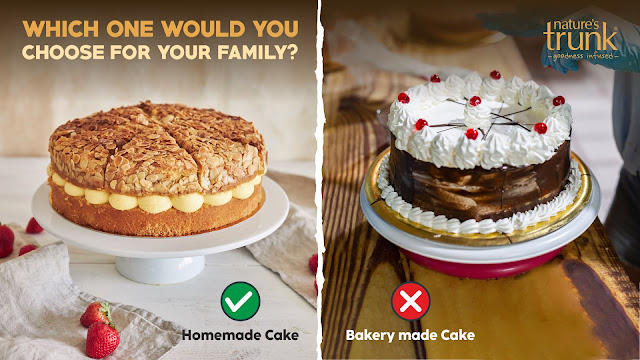Toxic Treats: What's Actually inside your Child's Favourite Cake?
Do you all believe
we're feeding our children chemicals rather than cake?
On every birthday, every
celebration, we make a nice, colourful cake for our children. But have you ever
thought about what's really hidden behind those bright, colourful decorations
and chemical colours? Unfortunately, a lot of bakery cakes contain extra
dangerous ingredients that can restrict a child's growth both cognitively and
physically.
Unexpected, isn't it? We give our
kids unsafe ingredients, food colouring, and toxic cake toppings while we enjoy
these foods ourselves. Let us see what such sweet treats contain and how they
impact our health.
Why are bakery cakes considered unhealthy?
Most of the cakes available in
bakeries contain more than flour, sugar, and eggs. They contain artificial
colours - colourful toppings and preservatives - so that they are more
attractive to look at. Some of the worst culprits are as follows:
1. Fake Food Colours: Beauty That Hurts
The bright red cherries, the blue
icing, and the brightly coloured sprinkles may look enjoyable, but what comes
with a cost? Baked foods have been known to use synthetic food dyes such as:
Red 40: It has a link to children's hyperactivity.
Yellow 5 & 6: They are known to cause allergies and behavioural
problems.
Blue 1 & 2: Can destroy the nervous system.
A few countries have forbidden
these colours due to their artificial nature, yet most bakeries still use them.
They can lead to issues such as ADHD
and mood swings, and even pose a higher risk for serious health diseases such as
cancer in the long run.
2. Hydrogenated Oils - The Silent Heart Killer
Most cake toppings, whipped
toppings, and chocolate frostings consist of hydrogenated oils (trans fats).
These oils:
Increase bad cholesterol levels.
Leads to obesity and
cardiovascular problems
Even a small piece of cake can
have an enormous amount of unhealthy fat, and thus it becomes even more
dangerous for children and causes inflammation in adults.
3. High-Fructose Corn Syrup (HFCS)—The Hidden Sugar
Have you ever gotten curious about the reason why baked cakes from the bakery are sweeter? It's because the bakeries often use high-fructose corn syrup (HFCS) as an artificial sweetener, which:
Spike's blood sugar level
Increases diabetic risk
Leads to weight gain and liver
problems
While natural sugar is not a drug
and does not trigger cravings for more sweets, HFCS is considered addictive and
often results in less healthy eating habits.
4. Chemical Additives & Preservatives - The Slow Poison
Cakes need to stay fresh for
days, and this is where the sodium benzoate and potassium sorbate preservatives
come into action. These preservatives increase shelf life but can also:
Harm the immune system
Trigger digestive disorders
Leads to long-term diseases like
cancer
How do these chemicals impact our kids' health?
Kids who have growing brains and
bodies have a higher sensitivity to toxic chemicals. These toxic elements
impact them in the following ways:
Brain Development Issues: Preservatives and colouring agents are
associated with hyperactivity, attention deficit disorders, and even lower IQ
levels.
Digestive Disorders: Cake chemicals can lead to stomach pain, bloating, and food intolerance.
Break down immunity: Repeated exposure to artificial additives
compromises the immune system of a child.
Childhood Obesity & Diabetes: Too much sugar and unhealthy fats
lead to obesity and juvenile diabetes.
Safer Options: How to
Select Healthier Cakes?
Rather than buying shop cakes
full of chemicals, use the following safer substitutes:
Go with the natural food colours: Rather than artificial colouring,
go for natural colours such as turmeric for yellow, beetroot for red, spinach
for green, etc.
Prefer Homemade Cakes: Attempt to prepare cakes at home by yourself
with genuine ingredients such as fresh fruits, honey, and pure vanilla essence.
Check Labels First: Steer clear of products with artificial
colours, trans fats, and high-fructose corn syrup.
Opt for Organic and Additive-Free Cakes: Today, several organic
bakeries provide cleaner options without chemicals.
In Conclusion: Think before
you eat
We all want a delicious slice of
cake, but not at the expense of our health. When you buy a cake the next time,
do check the ingredients. Make healthy choices, as what we consume today will
decide tomorrow's health.
Let's rescue our children from
poisonous chemicals and give them a genuine, sweet and healthy treat!
What do you think about cakes in
bakeries? Did you ever realise any impact on your child's health? Let's talk in
the comments!
Know more
1. Are all food colours bad for health?
No, using natural colours such as spinach, turmeric, and beetroot juice is okay. The toxic artificial
colours, Red 40 and Yellow 5, are the issue.
2. How can I check if my cake has harmful additives?
Before purchase, pay close
attention to the ingredient list of the package. Avoid cakes that include
hydrogenated oils, preservatives, or artificial colouring. Use handmade or
organic products.
3. Can artificial colours make children hyperactive?
Certain studies have proven that
artificial food colouring has been linked to children's hyperactivity, concentration
problems, and mood swings.
4. Is eating bakery cakes once in a while safe?
It is fine occasionally. But
frequent eating will lead to health problems. Healthier foods should be chosen
whenever possible. Incorporating more fruits, nuts, and whole grains into your
diet can provide essential nutrients while reducing the temptation for sugary
treats.
By making mindful choices, you
can enjoy the occasional indulgence without compromising your overall health.







Comments
Post a Comment